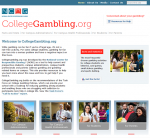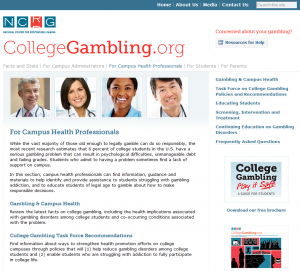Collegegambling.org Webinar Now Available Online

On June 1, theNational Center for Responsible Gaming(NCRG) hosted its secondwebinarof 2011, which provided an overview of the organization’s new resource,CollegeGambling.org, as well as the latest research on college gambling and gambling problems among college students. Visit theNCRG websitefor an archived version of the presentation.
Christine Reilly, senior research director for the NCRG, moderated the webinar and kicked off the presentations by highlighting the need for a resource to address gambling problems among college students. She explained that approximately 75 percent of college students gamble annually and 6 percent have a gambling problem; however, only 22 percent of colleges and universities in the U.S. have policies on college gambling.
To help fill this void, the NCRG partnered with the Division of Addictions at Cambridge Health Alliance, a teaching affiliate of Harvard Medical School, and established the Task Force on College Gambling Policies. In 2009, the Task Force issued10 policy recommendationsthat provided schools with a roadmap for reducing gambling among students and enabling those who are struggling with addiction to participate more fully in college life. Reilly explained that the NCRG worked with the Task Force to developCollegeGambling.org, giving more resources to help current and prospective students, campus administrators, campus health professionals and parents address gambling and gambling-related harms on campus.

Matthew Martens, Ph.D., associate professor of Educational, School and Counseling Psychology at the University of Missouri, Columbia, then provided an update on research he is conducting (through a grant from the NCRG) that examinespersonalized feedback interventions, a form of treatment designed to create dissonance regarding the negative behavior and encourage positive change in the recipient. “I want to measure feedback on situations where the student has difficulty refusing gambling and how to avoid those situations,’ stated Dr. Martens during the webinar. To learn more about his work on brief interventions, listen to the NCRG Insider interview.
The presentations concluded with a tour of CollegeGambling.org from Ryan Travia, M.Ed., director of Alcohol and Other Drug Services at Harvard University. Travia is also a member of both the Task Force on College Gambling Policies and the CollegeGambling.org advisory committee. During his talk, Travia navigated participants through each section of the site, giving detailed descriptions of the free resources for campus health professionals and students. Travia noted that “CollegeGambling.org is science-based and centers on research and campus polices that we studied.’
For more highlights of this webinar, you can also search the webinar live-tweet feed at #NCRGWebinar. Find out more about upcoming sessions in the 2011 NCRG Webinar Series, including the Aug. 24 webinar entitled “Adolescent Brain Development: Implications for Understanding Youth Gambling,” by visiting theUpcoming Webinarspage.
We have received great feedback about the NCRG Webinar Series and would like to hear from you! What topics would you like us to cover in future webinar sessions? Which researchers are you most wanting to hear? Please leave your suggestions in the comments below!
NCRG staffICRG Newsbettingcollegecollege gamblingcollegegambling.orggamblingNational Center for Responsible GamingresearchTask Forceuniversitywebinars

